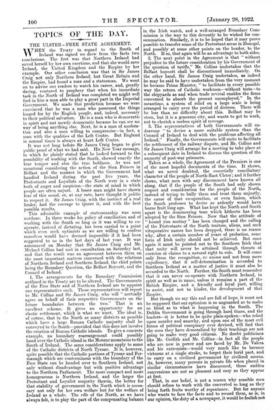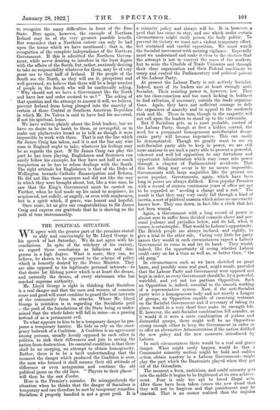TOPICS OF THE DAY .
THE ULSTER—FREE STATE AGREEMENT.
WHEN the Treaty in regard to the South of Ireland was signed we drew from the facts two conclusions. The first was that Northern Ireland had saved herself by her own exertions, and that she would save Ireland, the United Kingdom and the Empire by her example. Our other conclusion was that in Sir James Craig not only Northern Ireland, but Great Britain and the Empire, had found a man and a statesman. We went on to advise our readers to watch his career, and, greatly daring, ventured to prophesy that when his immediate task in the North of Ireland was completed we might well find in him a man able to play a great part in the Imperial Government. We made this prediction because we were convinced that he was a man who possessed the things longed for by the English people, and, indeed, necessary to their political salvation. He is a man who is democratic in spirit and not merely democratic because he can see no way of being anything else. Next, he is a man of modera- tion and also a man willing to compromise—in fact, a man with the qualities of the Left Centre. But England in normal times is always at heart Left Centre. It was not long before Sir James Craig began to give public proof of what we had said. His New Year message, in which he plainly stated that he looked forward to the possibility of working with the South, showed exactly the true temper and also the true boldness. As was not unnatural considering the action of the Sinn Feiners in Belfast and the manner in which the Government had handled Ireland during the past five years, the Protestants and Loyalists of the North were in a state both of anger and suspicion—the state of mind in which people are often unjust. A lesser man might have shown fear of this mood, or, at any rate, have thought it politic to respect it. Sir James Craig, with the instinct of a real leader, had the courage to ignore it, and with the best possible results. This admirable example of statesmanship was soon outdone. In three weeks his policy of conciliation and of working with the South so long as it was willing to co- operate, instead of dictating, has been carried to a point which even such optimists as we are willing to confess ourselves would have deemed impossible if it had been suggested to us in the last days of last year. It was announced on Monday that Sir James Craig and Mr. Michael Collins had met in consultation on Saturday last, and that the result was an agreement between them on the most important matters concerned with the relations of Northern Ireland and Southern Ireland, the chief points being the Boundary Question, the Belfast Boycott, and the Council of Ireland.
1. The arrangements for the Boundary Commission outlined in the Treaty are to be altered. The Governments of the Free State and of Northern Ireland are to appoint one representative each. These representatives will report to Mr. Collins and Sir James Craig, who will " mutually agree on behalf of their respective Governments on the future boundaries between the two." That is an excellent scheme. It gives an opportunity for an elastic settlement, which is what we want. The ideal is, of coarse, that in the North as many districts as possible which have a large Roman Catholic majority shall be conveyed to the South—provided that this does not involve the creation of Roman Catholic islands. To give a concrete example, no boundary rearrangement could possibly hand over the Catholic island in the Mourne mountains to the South of Ireland. The same considerations apply to some of the Catholic districts of North Tyrone. It is, however, quite possible that the Catholic portions of Tyrone and Fer- managh which are conterminous with the boundary of the Free State can be handed over to Southern Ireland, not only without disadvantage but with positive advantage to the Northern Parliament. The more compact and more homogeneous is Northern Ireland, and the larger the Protestant and Loyalist majority therein, the better for that stability of government in the North which is neces- sary not only for her own welfare but for the welfare of Ireland as a whole. The role of the North, as we have always felt, is to play the part of the compensating balance in the Irish watch, and a well-arranged Boundary Com- mission is the way to this devoutly to be wished for con- summation. Similarly, it is to be hoped that it may prove possible to transfer some of the Protestant areas in Donegal, and possibly at some other points on the border, to the North. If so, that again will be an advantage to both sides. 2. The next point in the Agreement is that " without prejudice to the future consideration by his Government of the question of tariffs," Mr. Collins undertakes that the Belfast boycott shall be discontinued immediately. On the other hand, Sir James Craig undertakes, as indeed he may be said to have undertaken from the very moment he became Prime Minister, " to facilitate in every possible way the return of Catholic workmen—without tests—to the shipyards as and when trade revival enables the firms concerned to absorb the present unemployed." In the meantime, a system of relief on a large scale is being arranged to carry over the period of distress. There will be less than no difficulty about this. Belfast may be stern, but it is a generous city, and wants to get to work, not to cherish a useless spirit of revenge. 3. The representatives of both Governments will en- deavour to devise a more suitable system than the Council of Ireland to deal with the problems affecting all Ireland." Finally, the Governments will unite to facilitate the settlement of the railway dispute, and Mr. Collins and Sir James Craig will arrange for a meeting to take place at a subsequent date in Ireland to discuss the question of the amnesty of post-war prisoners. Taken as a whole, the Agreement of the Premiers is one of the most hopeful documents of the time. It shows, what we never doubted, the essentially conciliatory character of the people of North-East Ulster ; and it further shows, what men with any discernment have known all along, that if the people of the South had only shown respect and consideration for the people of the North, instead of trying to bully them and treat them unjustly, the cause of that co-operation, or even fusion, which the South professes to desire so ardently would have borne fruit long ago. What has kept the North and South apart is the domineering tone which hitherto has been adopted by the Sinn Feiners. Now that the attitude of " hound you mutiny " has been changed and the calling of the Protestants of the North traitors, aliens, and such vituperative names has been dropped, there is no reason why, after a certain number of years of probation, some form of Irish unity should not be achieved. But once again it must be pointed out to the Southern Irish that that unity will never be attained through threats of coercion or claims to a natural right to rule. It will come only from the recognition, ex ammo and not from mere expediency, that if self-determination is accorded to Southern Ireland as a matter of justice it must also be accorded to the North. Further, the South must remember that it can never co-operate with Northern Ireland, in spirit as well as in name, unless it remains a part of the British Empire, and a friendly and loyal part, willing to assist, and not to hinder, the development of that Empire. But though we say this and are full of hope, it must not be supposed that our optimism is so unguarded as to make us blind as to what is happening in the South. The Dublin Government is going through hard times, and the leaders—it is better to be quite plain-spoken—who relied upon murder and anarchy, and upon one of the most evil forms of political conspiracy ever devised, will find that the men they have demoralized by their teachings are not going to make very good citizens. No doubt politicians like °Mr. Griffith and Mr. Collins—in fact all the people who are now in power and are faced by Mr. De Valera and his extremists—would very much like to become virtuous at a single stroke, to forget their lurid past, and to carry on a civilized government by civilized means. As, however, many persons in private life when placed in similar circumstances have discovered, these sudden conversions are not so pleasant and easy as they appear at first.
That, in our belief, is not a reason why sensible men should refuse to work with the converted so long as they bring forth fruits worthy of repentance. But for anyone who wants to face the facts and to record them, as is, in our opinion, the duty of a newspaper, it would be foolish not to recognize the many difficulties in front of the Free State. Here again, however, the example of Northern Ireland may be of the very greatest possible benefit. But remember that a Northern entente can only be had upon the terms which we have mentioned ; that is, the recognition of the complete independence of the Northern Government. If this is admitted the Northern Govern- ment, while never desiring to interfere in the least degree with the affairs of the South, but, rather, anxiously desiring to take no responsibility whatever for them, may be of very great use to that half of Ireland. If the people of the South see the North, as they will see it, prosperous and well governed, we believe that there will be a large number of people in the South who will be continually asking, " Why should not we have a Government like the North and have law and order secured to us ? " The asking of that question and the attempt to answer it will, we believe, prevent Ireland from being plunged into the anarchy of certain of those Central or Southern American Republics in which Mr. De Valera is said to have had his ancestral, if not his spiritual, home.
We have written plainly about the Irish leaders, but we have no desire to be harsh to them, or revengeful, or to make our phylacteries broad or to talk as though it were impossible to work with them. That is not the line which Sir James Craig has taken, and it is not the line any wise man in England ought to take, whatever his feelings may be as regards the past. If Sir James Craig can play the part he has been playing, Englishmen and Scotsmen can surely follow his example, for they have not half as much temptation as he has to refuse dealings with the South. The right attitude for Englishmen is that of the Duke of Wellington towards Catholic Emancipation and Reform. He did not like those measures and did not like the way in which they were brought about, but, like a wise man, he saw that the King's Government must be carried on. Further, when he had made up his mind to acquiesce, he acquiesced, not sulkily, or angrily, or even with sombreness, but in a spirit which, if grave, was honest and hopeful.
Once more, let us give our congratulations to Sir James Craig and express our gratitude that he is showing us the path of true statesmanship.



































 Previous page
Previous page